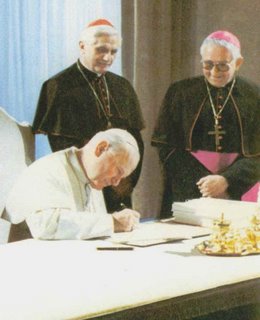The Code of Canon Law turns 25
 The psalmist sings "Happy is the man . . . whose delight is the law of the Lord; on his law he meditates day and night." (I: 1,3). The Psalmist is right.
The psalmist sings "Happy is the man . . . whose delight is the law of the Lord; on his law he meditates day and night." (I: 1,3). The Psalmist is right.Twenty-five years ago today, Pope John Paul II signed the apostolic constitution Sacrae disciplinae leges promulgating the revised Code of Canon Law for the Roman Catholic Church. It is a marvelous achievement, all the more so, I suggest, because it was developed during one of the most intense periods of antinomianism the Church ever suffered.
Canonical experts gathered in Rome this week to explore the impact of the revised Code. I look forward to reading their presentations. For my part, in honor of the 1983 Code's birthday, I'm posting a dozen canonical questions that I would like to see addressed over the coming years. Not that there aren't cogent answers to these questions now. But, as any first-year canon or civil law student knows, all laws undergo a gradual but constant process of re-examination. Sometimes that process results in the reformulation of laws, sometimes it results in their reiteration. But either way, one usually comes away with a better sense of the values behind the law, and a better appreciation of how laws help us attain to those values.
My list:
1. Is canon law essentially a juridic or theological discipline? SDL 18.
2. How might tribunal sentences be accorded precedential value? cc. 16, 1608.
3. Can laity hold office in the Church? c. 129, 145.
4. Was Ordinatio sacerdotalis an exercise of the extraordinary magisterium? c. 749.
5. How is defection from the Church distinct from schism? cc. 751, 1117.
6. Can penitents release confessors from the seal? cc. 983, 1388.
7. Can deacons perform anointing of the sick? c. 1003.
8. Is every marriage of two baptized persons necessarily a sacrament? c. 1055.
9. Should canonical form be required for the validity of Catholic marriage? c. 1108.
10. Should latae sententiae penalties be eliminated from canon law? c. 1314.
11. Is retroactive obrogation of a statute of limitations a violation of justice? c. 1362.
12. Should canonists have to pass an independent exam prior to practicing? c. 1483.
These are some of the things I'll be thinking about in the future. Here's hoping I come to understand them better.
PS: The next time you pray the Fifth Joyful Mystery of the Rosary, where Mary & Joseph find the boy Jesus teaching the scholars what Law really means (Luke II: 46-47), please remember us canon lawyers in your prayers. Thanks!









<< Home